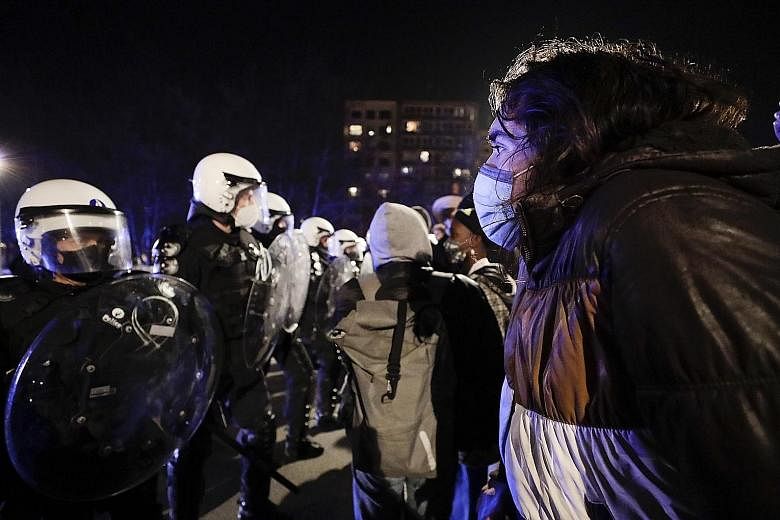BRUSSELS, ROME, GENEVA • Belgium will let shops reopen from tomorrow, but will keep other coronavirus curbs over the festive period, including limits on gatherings over Christmas and a ban on fireworks at New Year, said Belgian Prime Minister Alexander De Croo.
Countries across Europe have been battling a second wave of infections, and wrestling with how to keep their citizens safe while allowing them a little relief over the holidays.
"If we loosen too soon, the numbers will shoot up and then it will be very difficult," Mr De Croo told a news conference on Friday.
"If we have a third wave, it will be worse than the second and it will be harder to get out of it."
While Britain will allow up to three households to meet at home over Christmas, Belgian households will be able to be in close contact with only one additional person. People living on their own will be able to meet two others.
Non-essential stores will be allowed to reopen, but Belgians will have to shop alone and only spend 30 minutes inside.
Museums and swimming pools can open, but fireworks, a staple of New Year celebrations, will be banned to limit gatherings and foreign travel is strongly discouraged. Bars, restaurants, hairdressing salons, and sports and cultural centres remain closed.
Covid-19 has claimed 16,219 lives in the country of 11 million people, Europe's highest rate per capita of confirmed fatalities.
Meanwhile, the Italian government will ease anti-Covid restrictions in five regions from yesterday, including in the country's richest and most populous region Lombardy, the Health Ministry said.
Lombardy, Piedmont and Calabria will be downgraded from red to orange zones, while Sicily and Liguria will drop from the orange to the yellow zone, which has the least restrictions.
Friday's decision follows a gradual decline in Covid-19 hospitalisations in much of Italy over the past week, with the number of new cases also retreating from the highs seen earlier this month.
Italy introduced a three-tier zoning system three weeks ago, with calibrated curbs depending on a variety of factors, including infection rates and hospital occupancy.
Red zone residents are only allowed to leave their homes for work, health reasons or emergencies, while bars, restaurants and most shops are shuttered.
In the orange zone, people can move freely within their towns and cities, but cannot travel elsewhere. Bars and restaurants are closed, but shops can open.
Ms Maria Van Kerkhove, the World Health Organisation's (WHO) technical lead for Covid-19, said on Friday that even if countries see a fall in coronavirus cases, they need to stay vigilant.
"What we don't want to see is situations where you are moving from lockdown to bringing (the virus) under control to another lockdown," she told a virtual briefing in Geneva.
"It is in our power to keep transmission low. We have seen dozens of countries show us that it can be brought under control and kept under control."
The agency's top emergency expert said on Friday that it would be "highly speculative" for the WHO to say the coronavirus did not emerge in China, where it was first identified in a food market in December last year.
China is pushing a narrative via state media that the virus existed abroad before it was discovered in the central city of Wuhan, citing the presence of the coronavirus on imported frozen food packaging and scientific papers claiming it had been circulating in Europe last year.
"I think it's highly speculative for us to say that the disease did not emerge in China," Dr Mike Ryan said at a virtual briefing in Geneva after being asked if Covid-19 could have first emerged outside China.
"It is clear from a public health perspective that you start your investigations where the human cases first emerged," he added, saying that evidence might then lead to other places.
REUTERS











